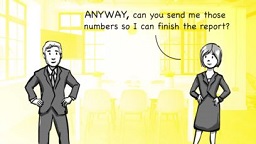 |
Grammar TV Page 9
Make .... Okay .... Adjectival Infinitives + Thing,
Stuff, A Lot .... Anyway .... Different Meanings of Have ....
Three-Part Phrasal Verbs .... Adjectival Infinitives -
Time, Place, Way .... Take .... The Disappearing That ....
Thing |
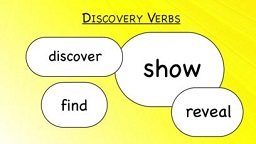 |
Grammar TV Page 10
Be Like, Be All .... Anyone vs. Everybody ....
Because of & Due to .... Commas .... Reported Speech
Historic Present .... Expletives .... Discovery Verbs
(Present Perfect Tense) .... Euphemistic Phrasal Verbs ....
Euphemistic Adjectives & Nouns .... Both...and, Not
only...but also |
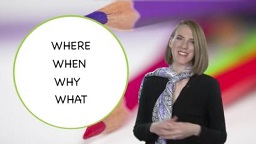 |
Grammar TV Page 11
How to Show You are Not Sure .... Sign up, Sign in
.... Common Transition Words .... Check in, Check up .... Wish
(Future) .... Wish (Past/Present) .... As If, As Though ....
Adjectives & Prepositions .... Starting Sentences With
Conjunctions .... Contronyms |
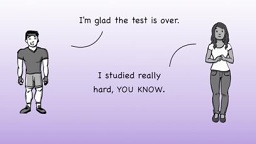 |
Grammar TV Page 12
Peek, Peak, Pique .... Em Dash, En Dash .... Assure,
Ensure, Insure .... Eager vs. Anxious .... Lend vs. Borrow
.... Subject-Verb Agreement & Phrases .... Yesterday, Ago,
Last .... You Know .... Tell, Say, Speak, Talk ....
Antecedents + Pronouns |
 |
Grammar TV Page 13
Ever Words .... I.e. & E.g. .... Words That Are Not
Words, But Are Words Part 1 .... Palindromes .... Words That
Are Not Words, But Are Words Part 2 .... I Before E Except
After C .... Conditionals (Without "If") .... Phrasal Verbs
+ Back .... Two -ing Words In A Row .... Phrasal Verbs +
Back (Part 2) |
 |
Grammar TV Page 14
Phrasal Verbs + Take .... Compound Nouns .... Noun
Clauses .... Participial Adjectives .... Portmanteaus ....
'Which' to Modify a Whole Sentence .... Zero Articles to
Make Generalizations .... Using 'Whose' .... Word Order of
Adjectives .... Be Supposed To |
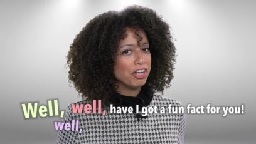 |
Grammar TV Page 15
Thing .... Adverbs .... Noncount Nouns .... Pronouns and
Gender .... Euphemisms .... Transitive Verbs ....
Intransitive Verbs .... Uses of Well .... Introduction
to Phrasal Verbs .... Verbs and Prepositions - Ask about |
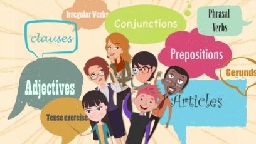 |
Grammar TV Page 16
Verbs and Prepositions - Talk
about .... Phrasal Verbs - Come up .... Phrasal
Verbs - Come back .... Make .... Imprecise noun
phrases – and stuff like that .... Adverbs Part 2 –
Really .... Keep + Gerund .... Go + verb .... Would
you mind? .... Be About To |
 |
Grammar TV Page 17
Phrasal Verbs – Go Out ....
Phrasal Verbs – Go On .... Sign Up .... Non-Count
Nouns Part 2 .... Contronyms .... 'You know' ....
Parallelism .... Transitions .... Always .... Be
Willing to |
 |
Grammar TV Page 18
It-Cleft Sentences .... Polite Speech & Past Continuous
.... Making Guesses .... Past Ability: Specific
Occasions .... Collocations .... Try .... Forget ....
Adjectives + Infinitives .... Adjectives + Gerunds ....
Recognizing Collocations |
 |
Grammar TV Page 19
Making Guesses. I Bet ....
Expressing Indefinite Plans .... Used to .... Be
Used to .... Qualities: As - As Comparisons ....
Actions: As - As Comparisons .... Amounts: As - As
Comparisons .... I Wouldn’t - If I Were You ....
Warnings with ‘Don’t’ .... Showing Annoyance:
Continuous Verbs |
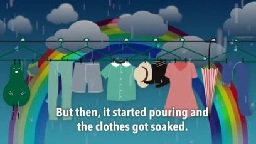 |
Grammar TV Page 20
Showing Annoyance: Wish + Would
.... The Verb Run, Part 1 .... The Verb Run, Part 2
.... ‘To’ and Place Adverbs .... Expressing Regret:
I Should Have .... Expressing Regret: I Wish I Had
.... Past Participles, Part 1 .... Present
Participles, Part 1 .... Past Participles, Part 2
.... The Present Participle, Part 2 |
 |
Grammar TV Page 21
What are Extreme Adjectives?
.... Rules for Extreme Adjectives .... Usually vs
Used to .... If and Whether, Part 1 .... If and
Whether, Part 2 .... Grammar for the New Year ....
Often in February |